How Easy It Is To Strip Metadata
July 4th, 2012by Gwyn Headley
Managing Director
Here’s a great photograph by Gabor Poszgai that we sold to The Sun yesterday:
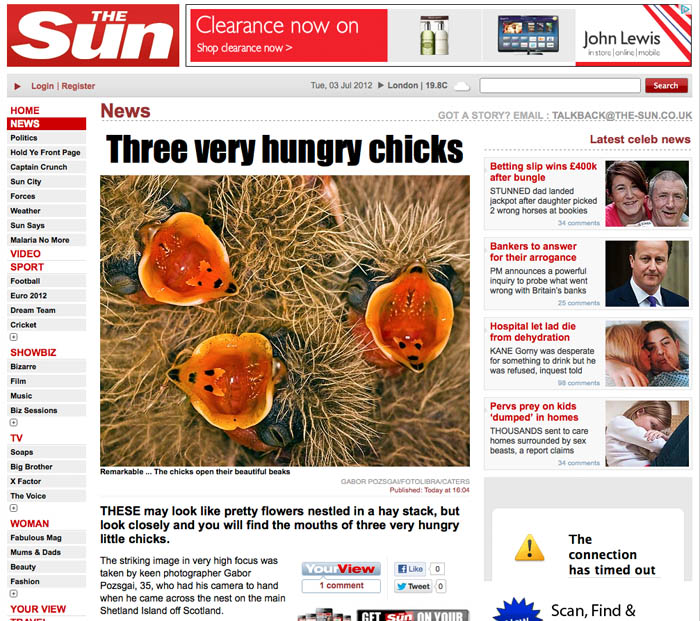
Purely as a matter of interest I tried to drag the image off the page. Obviously it had no fotoLibra watermark, as we had sold them the image, but I wanted to see how easy it would be to copy the image and use it for my own nefarious purposes — steal it, that is.
Here’s the message I got:
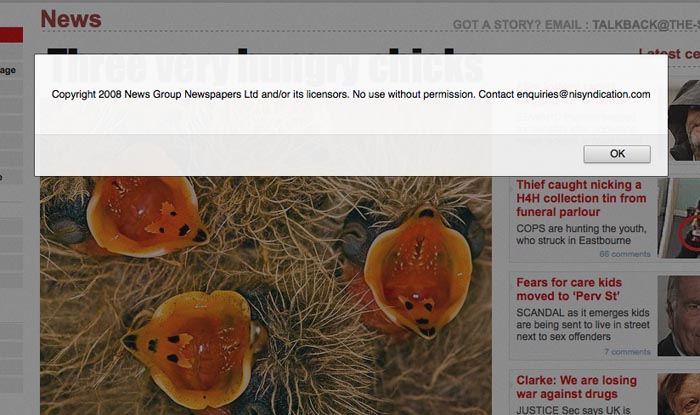
That’s interesting. I couldn’t drag the image off, and there was an image protection warning.
So I tried right-clicking it, a procedure incomprehensible to we Mac users but which involves holding down the ctrl key while tapping the pen on the tablet.
This is what came up:
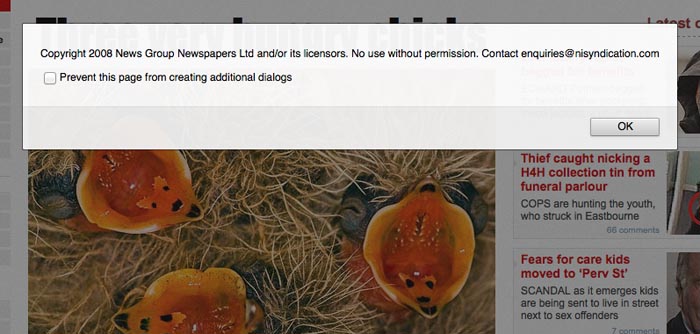
Gosh again. They really didn’t want me to pull off the photo.
So we pulled it off, and I had a look at the metadata.
When The Sun bought the image, it was supplied with full metadata including this caption and these keywords:
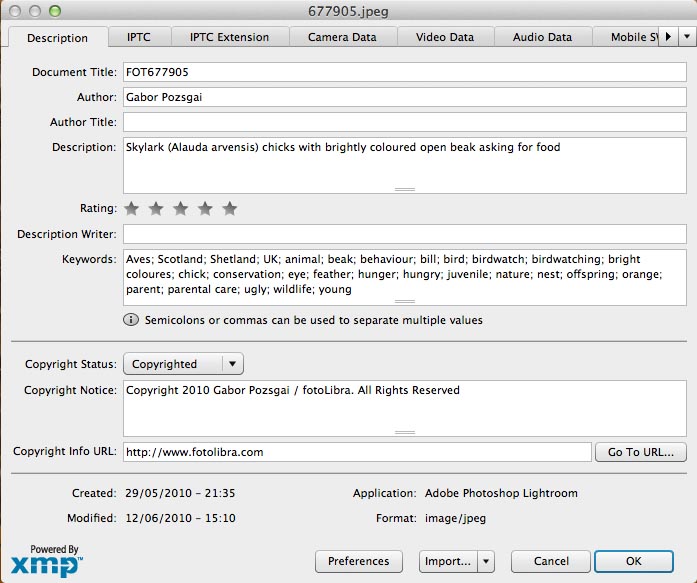
So you can see who took the picture, what it is, and where to find it. When I looked at the metadata for the image in The Sun, this is what I got:
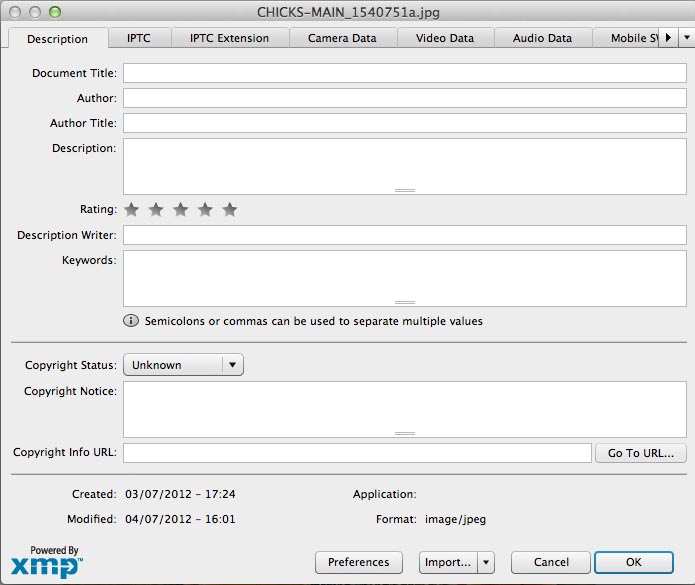
Empty. Blank. Nada. Bare. Stripped. Descamisados.
Why should they do that? Damien somewhat cynically remarked “Why keep it? They didn’t need it, so they threw it out.”
But that would mean extra work — someone would have to be specifically employed to hack off the metadata, unless it was an automated procedure. Why would News International want to remove the metadata from images they buy? Maybe Photoshop, with its inbuilt metadata stripping feature (see ‘Adobe — Stop Overcharging UK Customers‘) was to blame.
Anyway, I’m puzzled. What is the point of embedding metadata so it travels with the picture, telling you what it is, who took it and when, where it is, all about it, how to find it and buy it, if it’s simply thoughtlessly stripped out the first time it’s sold? It’s the writing on the back of the print. Why rub it out? What is the point? Who benefits?


I think someone should ask News International if they’re allowing resale of the picture as one of their own. Do they do this with all the pictures they license from 3rd parties? Are they that cash-strapped?
I couldn’t possibly comment on a valued client.
Very interesting, now everyone who reads this will know how to breach copyright if they follow your instructions.
Try it and tell me if it works, Mike.
Hi,
You didn’t delete any metadata with the procedure from above.
Go and look in the last tab of the window showed above “Raw Data” and you will see all the metadata.
Check that and let me know.
OK, I checked. No caption. No keywords. No photographer credit. No copyright info URL. There is data along the lines of < ?xpacketbegin=""id="W5M0MpCehiHzreSzNTczkc9d"?>
but I’m not certain how useful that is to a picture library trying to protect its photographers.
“Save for Web & Devices” on PS strips metadata, as it was for web use I presume this is what they did.
Interesting. We never use that function.
It was more relevant before the age of broadband, when webmasters needed to make their web page content as small as possible for faster page upload. Thankfully upload speeds now make this less relevant, making this need redundant.
Not true. From CS4 onwards Adobe listened to the grumbles of photographers and “Save for Web” has a panel in that dialogue called “Metadata” allowing you to select:
ALL
NONE
COPYRIGHT
COPYRIGHT AND CONTACT INFO
ALL EXCEPT CAMERA INFO
ALL
It used to. It no longer does by default. You have to explicitly tell PS Save for Web to dump metadata since, IIRC, CS2.
It could be that someone in IT routinely strips out metadata to reduce file size.
That’s what our IT guys say.
I think that what News International has done is tantermount to fraudulently changing or altering copyright and ownership information of a piece of copyrighted work!
Even if they purchased the pic for life, they have no right to alter the fact that the ownership belongs to Gabor.
I am no lawyer but I would think that unless this was challenged, News International would probably claim the right to sell and re-sell this photo as many times as they like. And how is Gabor going to find out, not to mention the agency that provided the shot in the first place.
Talk about a “law unto themselves”. Unbelievable!
Mark
Well I understand your rage because I share it, but the fact is that NI would not use a picture they had bought in another context for that very reason. Specific rights were bought and they are unlikely to transgress. They don’t need the hassle that would cause. So why strip the metadata — unless, as our IT guys aver, it’s to save 8k on the file size.
Oh dear Gwyn, I admire your faith in newspaper morality but it is utterly misplaced. There is an epidemic of unreported use with intent to avoid payment. I say that as a moderator of EPUK, whose 1,000 pro members encounter the problem on a daily basis – it is probably the most common issue we deal with.
Infringement is part of the cost-saving business model, and any photo they can get to is liable to be used without permission or payment. You will sometimes even see absurdities like (c)internet or (c)Facebook alongside – the Daily Mail has used both of these. The Sun, Mail, Independent and Guardian (and BBC) are particularly slack. They will always claim it is an innocent mistake if caught. However it’s a mistake they keep on making on an industrial scale.
This should not be news. It has been widely and repeatedly reported (BJP, AP, EPUK website, numerous photo blogs).
It took a long time to persuade Alamy that unreported newspaper sales are a serious problem but after being presented with hundreds of examples they now have a project group investigating the issue.
The fundamental problem is that pursuing infringements is time consuming and difficult, and what can be recovered is little more than the infringer would have paid for a license. That makes it a good bet to infringe and see if the copyright holder finds out and complains. Mostly they won’t. If they do, and try to claim more than the newspaper wants to pay, they are told they’ll be blacklisted. Of course, suing to recover microstock level fees is a complete non-starter – nobody is going to spend a day or two assembling a case, £50 on a summons, attend court, to recover £10.
I’m off on my holidays now so I won’t be able to respond to any more comments until Friday. Have fun!
it depends on what program they use. If they use something like paintshop pro and resize the image and save it then it loses the Metadata. Also with the right click protection this is easily overcome by doing a screen grab (Print screen in Windows) which also strips out the metadata.
All too common these days,
Pete
Another one for the Leveson enquiry?????
I think you are making life too hard for yourself – simply find the print screen key, on the keyboard, or use the snipping tool, and take the image that way or look at the image source..
http://img.thesun.co.uk/multimedia/archive/01540/CHICKS-MAIN_1540751a.jpg
and then look at the image properties
If you can see something on screen NOTHING can stop you copying the version on display.
As for stripping metadata – it is a basic “cleaning” process these days
http://en.wikipedia.org/wiki/Metadata_removal_tool
I’m disappointed at the misinformation and ignorance displayed here. Removing metadata is like taking the plates off a car, there is no legitimate reason to do it. Rest assured that sites that do it do not strip 500bytes for page load times. They do it because they have no respect whatsoever for the creator or owner.
Once your metadata is gone, your photo is likely to be propagated around the web, and nobody will know you own the rights.
Many of you appear to be unaware of the ongoing battle to annexe the copyright of photographs and other works whose authors cannot be found (“orphan works”). This has been running since 2005, through the Gowers Review, the Lammy and IPO consultations, the Digital Economy Bill (where the offending clause was defeated by photographers) and the Hargreaves review and endless subsequent consultations.
If you want to know where we are now, read this week’s Register piece by Andrew Orlowski
http://www.theregister.co.uk/2012/07/02/govt_copyright_white_paper/
I’d agree with David – They’re only doing everything that they can to reduce page load times. Suggesting that there’s any deeper malice at work here is quite ridiculous.
Within any modern news organisation there will be a team of folk responsible for publishing content online who look and consider every element on the web page they’re delivering. Not only that but the systems and automations they employ ensure that content published online is optimised as far as it can be – the size of everything is hugely important.
Technically, the thing that makes The Sun online more of a challenge I imagine is that they tend to have very long home pages by comparison to other newspaper sites, with literally dozens of different elements loading.
If they were to include the metadata for every image published then their customers who weren’t fortunate to have broadband probably wouldn’t bother waiting for the page to load.
Personally I think they’ve done a pretty good job at getting so much content onto their home page.
Nice shot too BTW.. (Hope the mother returned)
You are wrong. Stripping metadata has been a near universal newspaper practice for many, many years. Sometimes they insert their own.
Tampering with metadata is a criminal offence under the Copyright and Related Rights Regulatons 2003 – http://www.legislation.gov.uk/uksi/2003/2498/regulation/25/made
The uselessness of these regulations is that you have to be able to prove intent to infringe copyright.
Exelente
This is, sadly, no surprise to me. I have just discovered one of my images used by the on-line Sun that has been digitally modified by an in-house artist, published with no credits and then, remarkably, licensed by News Group Newspapers!
News International, and the Daily Express and Daily Mail, are masters at this sort of con. Any material sent to them at their request, once used legitimately, goes into the big syndication pot. This is despite statements that once used the material should be removed from all storage media. Material is routinely re-licensed and the author is only paid if he or she discovers the use. I have a friend who used to work on the Mail picture desk and have had this verified!
The problem is widespread and newspapers get away with it on two counts; one because authors seldom discover the illegal use and two because most authors are afraid to take on the might of the newspaper empire.
The problem with metadata in an image file is that it can be stripped out so easily; either on purpose or with software designed to reduce file size for on-line use as a previous correspondent noted. Both are illegal – ignorance of the law is no defence. Adobe should modify Photoshop et al so that metadata is locked in and can only be modified by the registered copyright owner or legal licensor.
Photographers often ask for this. Unfortunately no existing image file format can be modified to lock metadata. This is not my opinion but a statement of fact from Adobe’s John Nack. Besides there are legitimate reasons why the data has to change sometimes.
I’ll refer you to the only solution I know, which photographers really need to get behind and push, Plus. Read about it here: http://www.epuk.org/Opinion/985/on-the-plus-side
[…] have recieved many representations that stripping metadata is of concern….here's an example:- Sun strips metadata and claims ownership… But again, the IPO do nothing and claim its already illegal. It is, but there is no effective […]
I have never heard such ridiculous comments to justify stripping metadata. If the removal was so innocent then why change the Copyright Status tab from ‘Copyrighted’ to ‘Unknown.’
How is this going to impact page load times. People who don’t know what they are talking about should keep their mouths shut rather than justify the actions of news corporations who fail to give any regard to copyright and photographer’s rights. And yes, I’m talking from first hand experience.
If Stipple takes off ….. maybe that’s the future for image use on the web
http://www.stippleblog.com/
I’m not saying it’s justified or questioning the illegality of purging the metadata. I can also understand the concern and frustration at not being credited for the photo but the original question Gwyn posted here was ‘Why rub it out? What is the point? Who benefits?”
The answer to that question is that the removal of the metadata when the file was ‘optimized’ for the web simply saves on the amount of data being sent.
The fact that they have the javascript pop-up dialogoue window appear to tell Gwyn that he can’t copy the image doesn’t impact on the initial page load but is a successive command.
Who is going to benefit? Well one large group are going to be those readers of The Sun online who access it via dial-up or with a mobile device as they’re not going to have to wait so long.
Maybe if the image were submitted with the photographer’s credit and copyright info overlaid as text on top of the image (and to form part of the image) justified bottom right might be one way of having more success in getting the recognition deserved?
Seriously, if they really wanted to optimise their content for the web, do you really think their home page would be so bloated, and full of images (many of them animated, or changing through some code add-on) and other metadata? The html is almost 3000 lines of code, and contains hundreds of images.
That’s not an exercise in cutting delivered content size in action.
Images will be compressed as part of the settings on the website (assuming they use something sensible, and their users also use a vaguely sensible browser), so textual metadata will effectively be pretty small, and even when uncompressed, will only account for a few dozen bytes, or a few hundred if the description is verbose. I have no big issue with description text being cut, but the copyright information should be preserved, and there’s no excuse on that.
I would just like to add my weight and support to everything Tony Sleep says.
I think it is totally naive to think that large International organisations such as NI are concerned with stripping metadata to reduce file size. If file size is a problem for them they will just get their huge IT departments to sort it out.
On the other hand, especially if the picture is of major international importance, hiding the original copyright could mean the difference between the organisation earning possibly £100,000’s and the photographer earning. If you were the head of a major paper which would you choose? I think taking a chance – from the newspapers point of view – is well worth the increase in the bottom-line. And, if and when they are found out, they can easily apologise for the ‘error’ pay the licensing fees due to the photographer and no more will be said. meanwhile they have had the benefit of having the money in THEIR bank account all the time, and the continuing future possibility of future sales rather than the the Photographer.
Look….if a mighty, major conglomerate such as NI is prepared to routinely break the law by listening in and tapping into private conversations, do you really think they are going to worry about the copyright of some unknown photographer, somewhere in the world complaining about the ownership of one photograph.
I spent a great deal of my early life in the Music Industry, you wanna talk about copyright theft????
Strength to your arm Tony, BTW I am a member of EPUK and would recommend to all fellow Togs.
Regards